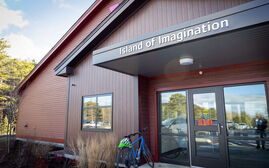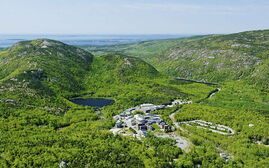Jackson Lab acquires New York Stem Cell Foundation to leverage biomedical data
 File Photo / Courtesy Jackson Laboratory
Jackson Laboratory, a genetics and genomic medicine organization headquartered in Bar Harbor, was awarded up to $30.6 million over three years to create digital heart models.
File Photo / Courtesy Jackson Laboratory
Jackson Laboratory, a genetics and genomic medicine organization headquartered in Bar Harbor, was awarded up to $30.6 million over three years to create digital heart models.
Jackson Laboratory, a genetics and genomic medicine organization headquartered in Bar Harbor, completed its acquisition of the New York Stem Cell Foundation, a nonprofit that developed an AI platform that supports large amounts of data related to stem cell research.
Lon Cardon, the lab’s president and CEO, said the deal “marks a turning point for biomedical research” that combines the lab’s expertise in genetics and mouse models with the foundation’s stem cell and automation technologies.
Together, he said, the capabilities will create a platform that accelerates early-stage biomedical research that could uncover disease mechanisms earlier and advance progress toward therapies for diseases such as Alzheimer’s, cancer, diabetes, Parkinson’s and rare diseases.
The deal unites the lab’s strengths in mouse genetics and disease research with the foundation’s stem cell technologies and advanced automation, plus their shared expertise in data science and AI, which together could speed up the discovery of new treatments and cures, the lab told Mainebiz in a follow-up email.
The deal was planned “for quite some time, with financing built into JAX’s long-term strategy,” the lab said.
As part of the process, 77 foundation employees join the lab’s 3,000 employees at campuses and facilities in Maine, Connecticut, California, Florida, Japan and now New York.
“We are not planning additional new hires right now beyond this integration,” the lab said.
The foundation is at 619 W. 54th St. in Manhattan.
Cardon announced the deal at the lab’s annual meeting in July.
The lab assumed the foundation’s operations and assets. Financial terms were not disclosed.
Individual biology
The foundation’s platform is called the “global stem cell array. The technology makes it possible to investigate biology at the level of individual patients, according to a news release.
The foundation was established in 2005.
“Together, we can move discoveries forward earlier and with greater precision, reducing the costly failures that too often derail later-stage clinical trials,” said Daniel Paull, who led the foundation’s efforts to combine automation, imaging and AI to uncover hidden disease features and now serves as the lab’s vice president of discovery and platform development.
The lab’s genetically diverse mouse models and the foundation’s automated array give researchers a platform to predict treatment responses, test the predictions on different human cells and validate results in whole organisms.
The integrated organization will operate as a nonprofit. The foundation will remain in Manhattan, adding to the lab’s network of research campuses in Maine, Connecticut, California, Florida and Japan.














0 Comments